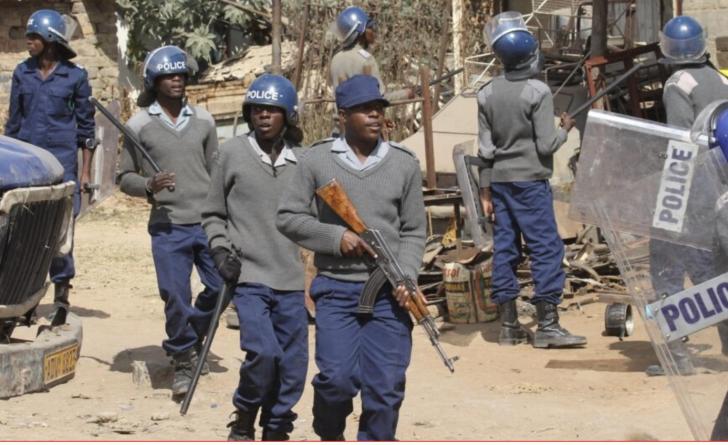Opinion / Columnist
Why some revolutions succeed
10 Jul 2023 at 07:22hrs |
14 Views

I am not sure if there is any truth to the talk of a Split in the Security Forces in Zimbabwe. I see on various news media that the Central Intelligence Organization has taken over the running of this year's elections an act that is reported to have angered the military people.
Historically, the game was usually over for a despot when his own security forces were split: Philippines (1986), Romania (1989), Nigeria (1998), Georgia (2003), Guinea (2009), and Tunisia (2011). Within the Philippine military and the police, disillusioned junior officers silently conveyed their grievances.
"This led to the formation of the Reform the Armed Forces Movement (RAM), Soldier of the Filipino People (SFP), and Young Officers Union (YOU). RAM which was led by graduates of the Philippine Military Academy Class of '71, Lt. Col. Gringo Honasan, Lt. Col. Victor Batac, and Lt. Col. Eduardo Kapunan, found an ally and mentor in the Defense Secretary Juan Ponce Enrile."24 In Tunisia, the army and military sympathized with the protesters, and senior army chiefs refused to fire on them.
Security Forces have also displayed weaknesses in other countries through citizens' act of kindness towards them like in Georgia, the security forces were either neutralized or charmed with roses (hence the Rose Revolution). In Kyrgyzstan, the security forces were overwhelmed by the presence of huge crowds of people, leading large numbers of police officers to switch sides. In Tunisia, the military sympathized with the street protesters. In Egypt, the riot police were outwitted by the youth movement and the crowd at Tahrir Square managed to charm the soldiers, who had been sent in a column of tanks to crush them.
In the end, everything boils down to Nature of Opposition Tactics: they must be united and must be capable of executing some brilliant tactical maneuvers and be strategic in their planning. They must be capable of taking over government buildings, police stations, state television, and airports.
This must be done in short time order because few people have the stomach for an extended protest that entails an extraordinary amount of sacrifice in terms of effort, time, and lost income. Enthusiasm to demonstrate in the streets quickly fades or wanes with the passage of time, which is the opposition forces' worst enemy. The Romanian revolution lasted 7 days; the Rose Revolution 21 days; the Orange Revolution 34 days; the Tulip Revolution 6 days; the Jasmine Revolution 28 days; and the revolution in Egypt 18 days; will they be any in Zimbabwe??????
Historically, the game was usually over for a despot when his own security forces were split: Philippines (1986), Romania (1989), Nigeria (1998), Georgia (2003), Guinea (2009), and Tunisia (2011). Within the Philippine military and the police, disillusioned junior officers silently conveyed their grievances.
"This led to the formation of the Reform the Armed Forces Movement (RAM), Soldier of the Filipino People (SFP), and Young Officers Union (YOU). RAM which was led by graduates of the Philippine Military Academy Class of '71, Lt. Col. Gringo Honasan, Lt. Col. Victor Batac, and Lt. Col. Eduardo Kapunan, found an ally and mentor in the Defense Secretary Juan Ponce Enrile."24 In Tunisia, the army and military sympathized with the protesters, and senior army chiefs refused to fire on them.
Security Forces have also displayed weaknesses in other countries through citizens' act of kindness towards them like in Georgia, the security forces were either neutralized or charmed with roses (hence the Rose Revolution). In Kyrgyzstan, the security forces were overwhelmed by the presence of huge crowds of people, leading large numbers of police officers to switch sides. In Tunisia, the military sympathized with the street protesters. In Egypt, the riot police were outwitted by the youth movement and the crowd at Tahrir Square managed to charm the soldiers, who had been sent in a column of tanks to crush them.
In the end, everything boils down to Nature of Opposition Tactics: they must be united and must be capable of executing some brilliant tactical maneuvers and be strategic in their planning. They must be capable of taking over government buildings, police stations, state television, and airports.
This must be done in short time order because few people have the stomach for an extended protest that entails an extraordinary amount of sacrifice in terms of effort, time, and lost income. Enthusiasm to demonstrate in the streets quickly fades or wanes with the passage of time, which is the opposition forces' worst enemy. The Romanian revolution lasted 7 days; the Rose Revolution 21 days; the Orange Revolution 34 days; the Tulip Revolution 6 days; the Jasmine Revolution 28 days; and the revolution in Egypt 18 days; will they be any in Zimbabwe??????
Source - Sam Wezhira
All articles and letters published on Bulawayo24 have been independently written by members of Bulawayo24's community. The views of users published on Bulawayo24 are therefore their own and do not necessarily represent the views of Bulawayo24. Bulawayo24 editors also reserve the right to edit or delete any and all comments received.
Join the discussion
Loading comments…









































